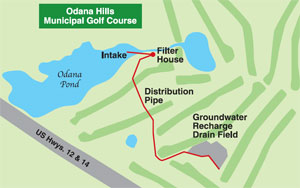Groundwater Recharge Project
The West Campus Cogeneration Facility is jointly owned by MGE and UW-Madison. It began operation in the spring of 2005 to provide heating and cooling for the UW-Madison campus and electricity for the Madison area.
 Since the facility withdraws water from Lake Mendota for operation, a group of City of Madison, Dane County, UW-Madison and the Wisconsin Department of Natural Resources (DNR) experts recommended the Odana Hills Groundwater Recharge project to ensure that the water withdrawal didn't impact the lower sections of the Yahara River during very dry periods.
Since the facility withdraws water from Lake Mendota for operation, a group of City of Madison, Dane County, UW-Madison and the Wisconsin Department of Natural Resources (DNR) experts recommended the Odana Hills Groundwater Recharge project to ensure that the water withdrawal didn't impact the lower sections of the Yahara River during very dry periods.
The Odana Hills Groundwater Recharge project was designed in 2006 to infiltrate a portion of the storm runoff from the Odana Pond watershed into the groundwater system. It is part of a two-stage water mitigation plan to offset impacts of water use at the West Campus Cogeneration Facility.
Project Details
The Odana Hills Groundwater Recharge infiltration system:
- Helps reduce sediments and nutrients carried into Lake Wingra through storm sewers to help improve water quality.
- Supplements the flow of springs that feed Lake Wingra and area springs.
- Demonstrates feasibility and benefits of stormwater infiltration.
During operation, water from a pond located at the Odana Hills Golf Course is filtered, pumped to higher ground and infiltrated into the soil in a specially engineered underground drain field located on the golf course.
Environmental Protections
The project was carefully designed to minimize any impact on Odana Pond. The following protective steps were incorporated into the project:
- The infiltration system pump automatically shuts off if the pond level drops below a set point in order to minimize impacts to the pond's aquatic organisms.
- A new water control structure helps maintain the level of the smaller pond to the east of the Odana Pond and the waterway that connects the two ponds.
To help the long-term water quality and habitat of the Odana Pond, MGE and Madison Parks Department worked with the neighborhood to make a number of improvements. These included:
- Strategically placing logs for use by turtles, herons and other wildlife.
- Creating turtle nesting areas on side of the pond near the golf course.
- Installing a bat house to help control mosquito populations.
- Planting native aquatic plants to improve fish and turtle habitat and water quality in the pond.
Odana Hills Groundwater Monitoring Reports
Wisconsin Department of Natural Resources (WDNR) reports contain analysis results required by the State of Wisconsin. Supporting detailed lab reports are also available for each report date.
For more information or for historical data, please email mge@mge.com.